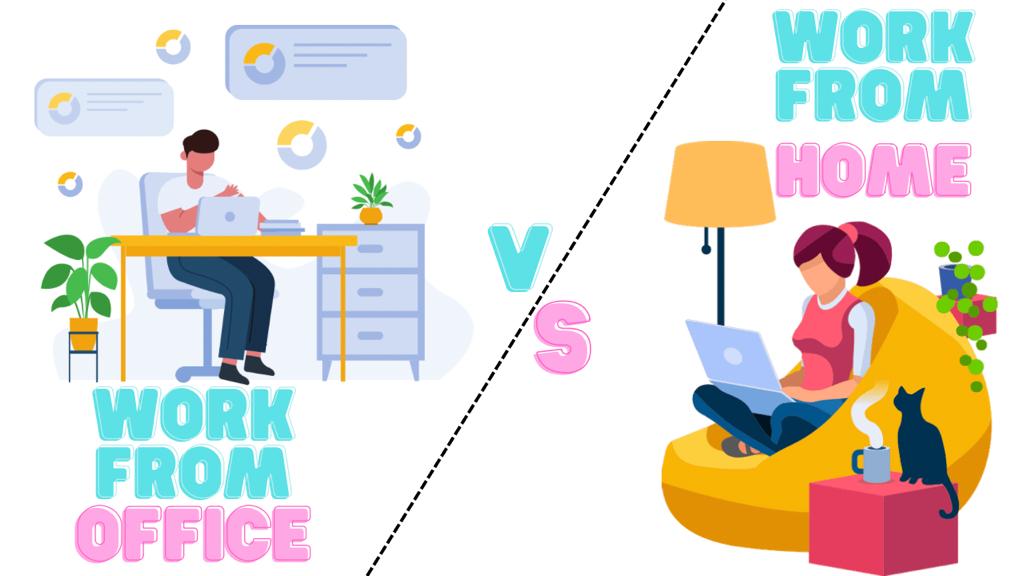
Introduction
Since the globe began consuming more and more digitally, there has been a debate or group discussion over this topic, with supporters of either side offering interesting but opposing arguments for their position. Those who favour Work from Home VS Office arrangements contend that it allows their schedules some much-needed flexibility, while proponents of the work-from-office school of thinking to assert that the entire purpose of an office setting is to establish a climate that rewards effort and fosters teamwork.
What are Your Priorities?
There are advantages and disadvantages to work from home VS office. But before we discuss the advantages and disadvantages in greater detail we see these questions coming up:
How content are you, at work or at home?
How much time do you lose each day commuting?
Do you long for the workplace networking chances you once enjoyed?
At home, do you feel diverted?
If you are an employee who may have the option of working from home or in an office, you should first think about what is most essential to you. Your productivity or general quality of life might be affected, certainly, in one way or another. Working from home has helped some people achieve a much better work-life balance than it has for others. There are many who can only achieve work-life balance when their work and personal lives are completely distinct. This is all very personal and something to think about. Knowing when to make a change is crucial if you have the decision to make.
Work from office Advantages & Disadvantages
Despite the numerous advantages of working from home, the office setting continues to be admired.
Work from an office Advantages
Instead of merely offering a separate place where employees can contribute to the growth of an organisation, offices are valued for their productivity since the environment is highly engaging & its easier to co-ordinate, communicate & collaborate
1. Communication
The most effective and transparent form of communication in a professional situation is face-to-face interaction. It not only helps with company planning, but it also improves rapport and connections with coworkers. No other situation can foster relationships the way it does when you sit next to someone or run into them at the coffee shop. A seamless communication structure is one that recognises and fixes flaws almost as soon as they are recognised and guarantees transparency. And it results in the best output being produced, which allows you to do your everyday tasks and follow the chain of command. In case of Work from Home, it’s noticed that communication between co-workers decreases & that results in delay or tasks taking more time.
2. Co-ordination
Every organisation has a clear management structure. An organisation produces the optimal output through meticulous coordination and feedback, and each employee is accountable. This cycle is only possible when the manager is present among the staff, monitoring activities, identifying mistakes as they made them, providing clear instructions to a troubled employee, and managing workflow. Management becomes difficult when everything is digital, and work could be frequently late or of poor quality.
3. Collaboration & Productivity
When it comes to making decisions based on priorities, it’s critical for employees to know who they are. For many people, working from home is incredibly distracting and full of difficulties. Returning to work can make it easier to maintain self-control and give pre-made, simpler structures for completing to-do lists. It helps in collaborating more, resulting in higher team work & in turn increase in productivity due to the vibe that work from office & a good work culture cultivate.

Disadvantages of Work from Office
While there are some obvious benefits to continuing to visit your offices, there are also some evident drawbacks:
1. Rigid Organizational Rules
You have very little control in an office setting. Your work schedule is set, you have a set commute, and your job description is somewhat predictable. Maintaining a rigid work schedule is essential when working from an office. You must arrive at your desk every day before your bosses detect a delay. No matter your issues or the circumstances that are working against you, come rain or shine.
In case of toxic workplace, physical and mental health will deteriorate more in Work from Office than in Work From Home as a result of the constant pressure, making you more prone to burnout. However, if the work culture is good then whether its work from office or work from home, it doesn’t tend to be prone to burnout.
2. Work Environment
The type of working environment promoted by the company is one of the most important considerations in the discussion between working from home and working from an office. Your workplace environment can make or break your motivation and productivity.
In an office context, employees don’t have much say or control over their working environment. You just have to put up with it, regardless of the obnoxious coworker or other practical difficulties. At home, one can customise their office to suit their needs and interests.
3. Reduced Autonomy
Your autonomy as a worker will decline as a result of being on a team in the workplace. For the majority of us, this entails shared initiatives, teamwork, and perhaps even a more regimented timetable. While you may find this tempting if you’ve felt a significant deficiency in this area, other individuals may find this to be a disadvantage of an office job.
Work from Home Advantages & Disadvantages
Discussing the benefits and drawbacks of working from home
Work from home Advantages
1. Reduced/No Commute
Working from home has several advantages, one of which is not having to commute. People in India typically spend at least two hours every day travelling to and from work. This severely hampered the work-life balance, in addition to the fact that they are wasting time that they should be using effectively.
It’s normal for someone who works a standard 9–to–5 (or 6) job and spends 7% of their day in traffic, to feel like they have no life outside of work. It doesn’t seem as burdensome as it did before, though, since many jobs can be now done from the convenience of your couch.
It is all about good work culture. WLC allows employees to have their own flexible schedules & option to work from home so that they save commute time & spend more quality time with their family.
2. Better Work-Life Balance
It is crucial to understand that labour does not constitute life’s ultimate goal. You do have a life outside of work, but it seems like a lie when you spend practically half of your day in an office. Furthermore, a strict schedule full of work might make people burnout pretty soon.
Most firms that provide their staff with the choice to work from home also give them the freedom to select their work hours, so employees can begin and end their days as they see fit, as long as they finish their job and produces positive results. When it comes to taking care of the demands of your personal life, this autonomy over your work schedule is priceless at WLC.
3. Saves Money and Reduces Carbon Footprint
Both the employer and the employee save money when they work from home. The employee doesn’t have to pay for transportation, meals, and other expenses that come up during the course of the day and the employer saves a lot on energy costs and other associated costs that would have been unavoidable in a fully operational office setup.
This is good for your budget, but it’s also good for the environment because shorter commutes mean fewer cars on the road, which unintentionally helps to clean up our environment, which is desperately needed right now.

Working From Home Disadvantages
Therefore, working from home has some significant advantages. It does, however, provide certain difficulties:
1. Teamwork and Organizational Growth
Working remotely is inherently detrimental to teamwork. Employees’ workloads are typically broken up into manageable chunks according to their job descriptions, and as long as they reached their daily targets, everything should go according to plan. However, a single challenge might throw the entire group off course.
Even though it is feasible, coordinating with numerous individuals over the phone or through video chats is ineffective since it prevents face-to-face encounters. Over a Zoom call, where ten other people are vying for screen time, it takes a long time to get ideas through for approval. Working from home can therefore hinder collaboration and result in chaos.
2. Productivity Trap
According to widely cited surveys, the majority of respondents believe that working from home increases their productivity significantly. This sensation is only converted into action, which is essential for keeping a consistent flow of output when you have a set schedule. Although the comforts of home are pleasant, every element can be detrimental.
At home, procrastination might run wild or, worse yet, you might find yourself overworking. Additionally, working alone can kill your ability to be creative, therefore, doesn’t necessarily ensure success.
3. Mental Health
Employers must take into account employee wellbeing as a major consideration when establishing workplace and work arrangement rules. Long-term work from home arrangements may not necessarily be ideal for an employee’s mental health, as some interesting data suggests.
A hybrid method of working
Employees are not required to work solely from home as a result of the shift toward remote work. The most effective method frequently involves dividing time between home or other remote locations and the business. To involve them in the process of creating a hybrid working policy, you might ask your team for feedback on their experiences working from home.

Work from Home VS Office: Where Does the Future Lie?
There are advantages & disadvantages to both of the approaches. We acknowledge, however, that the solution might lie in achieving some sort of balance between the two. Separating the workweek into days when workers can work from home and days when they must report to the office can not only maintain the benefits of a work-from-home environment but also eliminate the stifling of creativity and the flow of work. Hence we support flexible Hybrid model at WLC and let team members choose whether they would like to work from home or work from office or do both.




